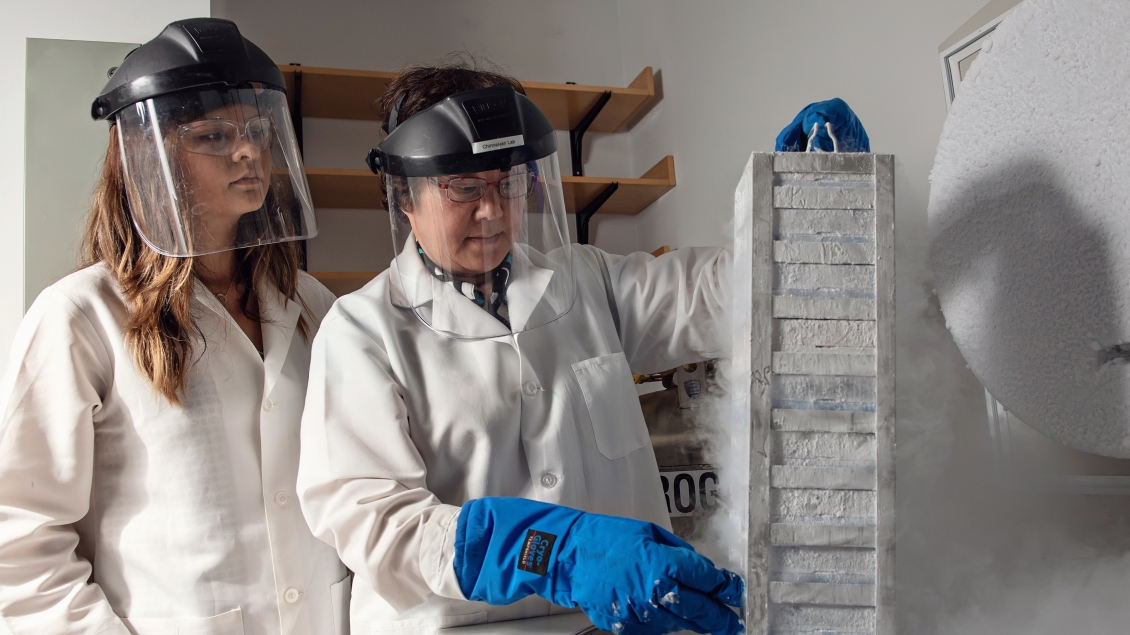-
Bioinformatics -
Biological Chemistry -
Cancer Biology -
Cell & Developmental Biology -
Cellular & Molecular Biology -
Genetics and Genomics -
Health Infrastructures & Learning Systems -
Immunology -
Microbiology & Immunology -
Molecular, Cellular & Developmental Biology -
Molecular & Cellular Pathology -
Molecular & Integrative Physiology -
Neuroscience -
Pharmacology

MCDB
Conducting basic research about the function of all branches of life
Program Overview
The Molecular, Cellular, and Developmental Biology PhD program is designed to provide an exceptional and inclusive training environment. The overall goal is to provide our students with the scientific knowledge and technical skills needed to become successful independent scientists while also providing enough flexibility to allow students to develop and explore their own research interests.
The Molecular, Cellular, and Developmental Biology program offers an impressive breadth of scientific approaches, experimental expertise and biological diversity with an emphasis on model systems used to answer questions central to all aspects of human health and biotechnology. This scientific breadth is distinctive, in that it offers students the opportunity to pursue studies in molecular, cellular, and developmental biology, and to learn techniques in genetics, genomics, biochemistry, structural biology, cell biology, and specialized imaging through the use of diverse experimental systems that include a wide range of bacteria, yeast, C. elegans, Drosophila, Arabidopsis, Xenopus, zebrafish, mammals and human cell culture.
PhD students in MCDB will receive the intensive training needed to become independent scientists, while also gaining an appreciation for the diversity of approaches and experimental systems that make modern molecular sciences such an exciting and important scientific discipline.
The MCDB program encompasses ~80 PhD students, 20 master’s with 40 internationally recognized mentoring faculty, including six faculty with joint appointments. Approximately 12 graduate students join the program each year. MCDB is a growing department hiring ~1-3 new faculty each year with ongoing plans for additional faculty recruitment. Our department moved into a new state-of-the-art building in the summer of 2018 providing our students with cutting-edge research equipment and collaborations for public outreach through the Museum of Natural History shared within our new building.
Faculty in MCDB have won numerous university and international research awards, teaching awards, and the program cares deeply about the educational experience of its graduate students. In turn, MCDB students have received many recognitions and awards, including fellowships from the National Science Foundation, NIH, American Heart Association, university-wide Rackham Fellowships, and Outstanding Teaching Awards. More than 35% of MCDB student alumni have moved onto academic positions after graduation, with recent graduates accepting prestigious postdoctoral positions at top-flight research institutions. MCDB at University of Michigan was ranked as the 3rd-best MCDB program in the country by the National Research Council Survey.
Creative and innovative research is the hallmark of our graduate program in MCDB. Our program is designed to provide a nurturing environment in which graduate students can fully develop and express their intellectual interests, research talents, and teaching abilities. These goals are accomplished through an integrated program of independent research, graduate courses, seminars and teaching.
Coursework
Our curriculum is geared towards preparing our students to think as independent scientists yet allows them to transition to full-time research activities quickly. In the fall, students take research ethics (PIBS 503) and MCDB 527 (Molecular Biology), a course that introduces students to modern molecular biology approaches. In the winter term, students take MCDB 528 (Cell Biology), a course that builds on skills in experimental design and hypothesis testing and provides students with a strong foundation in modern cell biology techniques. In fall of their second year MCDB students take MCDB 615 a proposal writing course to help students learn successful approaches to grant writing. MCDB students are also required to complete a minimum of 4 hours of graduate level work in a field or fields other than their area of specialization to broaden their intellectual scope.
During the first year, students engage in at least two research rotations in MCDB faculty labs in order to identify a research mentor and a laboratory in which to conduct dissertation research. Most students rotate in three to four labs during their first year. These rotations also provide training in the development of a research plan as well as skills in analytical and critical interpretation of experimental data.
Preliminary Examination
The Preliminary Examination consists of an oral exam at the end of the first year, which covers topics from MCDB 527 and MCDB 528. For PIBS students who wish to join an MCDB lab without taking these courses, our department offers an alternate oral qualifying exam at the end of year 1 over a primary literature research paper.
Teaching Requirement
The Department requires that all PhD students teach at least two semesters as part of the degree requirements.
Expected Length of Program
Doctoral students typically take 5-5.5 years to complete their dissertation.
In addition to formal training, students also participate in other scientific and social activities that enhance the experience of pursuing a doctoral degree. For example, MCDB students are invited to a weekly lunch with external seminar speakers to gain additional insights and new perspectives on both research problems and on different opportunities for careers in science. The program also offers an annual research retreat to encourage student interaction with each other and with the faculty.
The program encourages students to organize frequent social events throughout the year, in addition to departmental festivities including a student only Departmental retreat. These activities are facilitated by the Graduate Student Council, an organization of graduate students in the department. Collectively, the MCDB program seeks to provide a full and complete educational experience for our doctoral students.
MCDB doctoral graduates are highly competitive for prestigious postdoctoral positions. In addition, many of our students have gone directly to highly productive careers for a variety of companies and the government, with their graduate training providing the necessary knowledge and skills to succeed in a competitive marketplace.
Learn more about the Department of Molecular, Cellular & Developmental Biology.